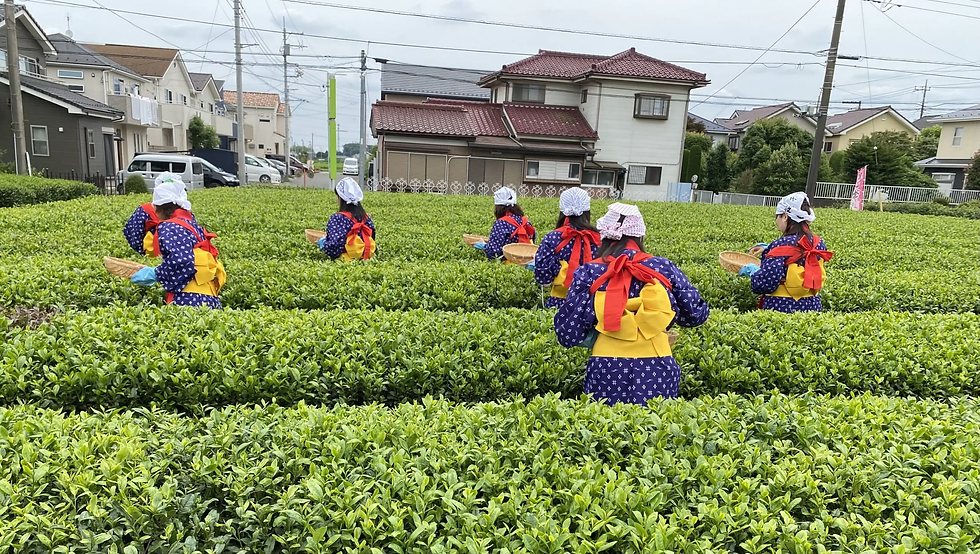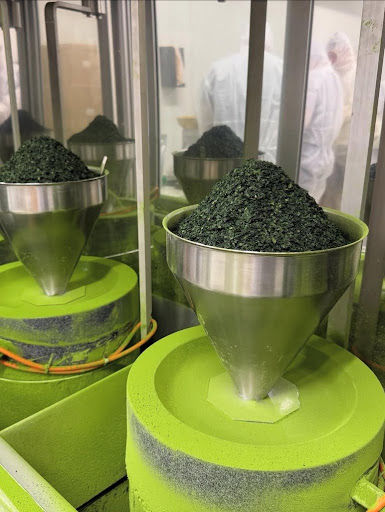People-to-People: Ian Chun’s Mission to Connect the World Through Japanese Tea
- Lorela Lohan

- Aug 9, 2025
- 7 min read
Updated: Aug 26, 2025
Interview with Ian Chun, Founder of Yunomi.life


Lorela: Ian, let's begin with your personal story. What led you from Hawaii to Japan, and eventually into the world of Japanese tea?
Ian: Growing up in Hawaii meant I was constantly surrounded by a blend of cultures, and Japanese culture was a prominent one — particularly in its influence on food culture in Hawaii. But it wasn’t until I moved to the mainland U.S. for college that I began to see it all through a new lens. I initially studied astronomy, but I soon found myself gravitating toward Japanese literature and philosophy. That shift led me to spend a year studying abroad in Japan. Once I was there, I knew I wanted to stay.
My path into tea was a coincidence.
I had a career in publishing and IT product management, and experience helping my former employer create online stores for their products at a time when there were few systems to make launching an online store easy. I was doing translation and consulting work freelance when I was introduced to Kyoto Obubu Tea Farm.
They were producing great tea, but struggling to connect internationally. I offered to help them manage their international business expansion. That experience opened my eyes: the Japanese tea industry was filled with talented, passionate producers — but they were largely invisible to the rest of the world due to language, logistics, and cultural barriers. I realised I could help these wonderful people find new markets through e-commerce and began taking on many other farmers.
That consulting business became the foundation for Yunomi.life — a platform that wouldn’t just sell tea, but introduce the people behind the product to the world; put them on the front stage in the spotlight.

Lorela: When you started Yunomi.life, what were the early hurdles?
Ian: The first major hurdle was figuring out the business model. At first, I envisioned Yunomi.life as a seller-managed marketplace — something like Etsy for Japanese tea. But that idea quickly hit a wall.
Most tea farmers in Japan — especially those who are truly dedicated to their craft — operate small, family-run businesses. They don’t have the time, English proficiency, knowledge of regulatory issues, or infrastructure to manage international sales.
So I had to shift. We pivoted to buying and managing the inventory ourselves — handling translations, packaging, and shipping. But that introduced a whole new set of challenges. Logistics were complex. Compliance with food safety regulations across different countries was a constant obstacle. And then there was trust — convincing farmers to let a foreigner represent their life’s work abroad. That took time, consistency, and real relationship-building. We had to prove, repeatedly, that we were committed to the long haul.
Lorela: And today, you work with over a hundred producers. How did you manage to grow that network?
Ian Chun: Over 200, actually. It was created very patiently and very personally. We built our network one farm at a time. I travelled to different tea-growing regions across Japan — Shizuoka, Uji, Fukuoka, Kagoshima, and many lesser-known ones too. I sat down with producers, tasted their teas, and heard their stories.
Trust is everything in this industry. Some producers came on board quickly, others took years.
What we offered wasn’t just a sales channel. It was a partnership. We helped with regulatory compliance, marketing, logistics, even when our sale of their product wasn’t involved. Over time, word spread. Some producers started approaching us.

Lorela: You’ve spoken about Yunomi being a "people-to-people" platform, not just "farm-to-table." What does that mean to you?
Ian: “Farm-to-table” is a powerful idea, but it often reduces the producer to a company and a brand. We wanted consumers to know that there is a person behind the product.
At Yunomi.life, we treat commerce as a conversation between the person who grew the tea and the person who drinks it.
We translate product reviews from English into Japanese so that farmers can see what overseas customers are saying. It’s meaningful — for someone in a small Japanese village to read that their tea was enjoyed in Paris or New York. On the flip side, we include producer bios, photos, and regional information so that customers can learn where their tea came from and who made it. We believe that appreciation deepens when you know the people behind the leaf.

Lorela: It seems you’ve also built a global community of tea lovers. How did that happen?
Ian: It grew organically through transparency and shared passion. Early on, we had a Product Review Club, where customers could try teas and share honest feedback — not just for us, but for the producers. That helped establish a culture of learning and exploration.
Later, we launched Matchaholics by Yunomi.life, a Facebook group that has over 26000 members as of July 2025. It’s focused on Japanese matcha — and we moderate it carefully to keep the discussion respectful and informative.
We have another Facebook group for Japanese tea connoisseurs as well. Many people share teas from other companies, and that’s fine. Our goal is to foster community, not dominate it. We believe that the rising tide lifts all boats.
Lorela: Speaking of matcha, what’s your perspective on the current matcha boom?
Ian: Matcha is having a moment globally — and that’s both exciting and concerning. On one hand, the popularity has brought attention to Japanese tea traditions. But on the other hand, there’s a lot of confusion and misinformation. Terms like "ceremonial grade" are used loosely, with no industry standard.

We have our own standards and grading system at Yunomi.life/matchagrades to give meaning to the term “ceremonial grade” or “imperial grade”, but usage of the term globally has really diverged from the actual matcha used in the tea ceremony world.

What’s even more interesting is how the use of matcha has evolved outside Japan. Most people don’t realise that the modern matcha latte — the creamy, sweetened version that’s so popular today — was first popularised by Starbucks Japan in 2005. It sparked a boom then that made matcha lattes a staple on menus at cafes. But today, the drink in Japan is no longer new and exciting, while the innovations occurring around the world are absolutely amazing.
Matcha, outside of the tea ceremony practice, is not a daily drink in Japan for people outside the ritualised practice. It’s found in ordinary matcha lattes and lots of sweets found seasonally at supermarkets.
Meanwhile, matcha’s popularity outside of Japan is mindblowing—it is in everything, from cupcakes to cosmetics. That’s not inherently bad, but it is a limited resource. The demand has created a supply-demand imbalance.
Japan produces about 4,000 tons of matcha per year—less than 10% of total Japanese green tea production, but global demand is far outpacing that. To match even 1% of the global coffee industry’s scale, we’d need 30,000 tons or more.
Scaling to that volume can’t be done in a year; it is a multi-year, perhaps multi-decade effort.
Lorela: And how does Yunomi fit into that challenge?
Our mission is to preserve integrity in a fast-moving market.
We work to highlight the work of small producers — giving them access to international buyers who care about quality, tradition, and sustainability. We also educate consumers. Every product listing comes with detailed information about where it came from, how it’s made, and how to brew it.
We don’t just sell matcha, we don’t just sell tea — we share the story of the people behind it.
For many of our producers, Yunomi is their only bridge to the global market. They don’t have the bandwidth to export in terms of communication and logistics, but we make it possible — handling everything from translation to international compliance, to physically getting products from Japan to the doorsteps of consumers from New York, USA, to Perth, Australia.
Lorela: What role has technology played in making Yunomi more than just a marketplace—especially in translating feedback, managing logistics, and sharing stories?
I initially built e-commerce systems using WordPress, but switched to the Shopify platform in 2015 along with a fairly large number of customisations and apps to create the platform that is currently Yunomi.life. We have negotiated with FedEx, DHL, UPS and the Japan Post to provide an unprecedented global reach, connecting our partners and buyers worldwide in sometimes as little as 2 days.
A custom review system guides consumers in writing reviews that provide excellent feedback for both other enthusiasts and the producers themselves. Without all of the technology that has been developed over the last decade, there is no way Yunomi.life would exist as it does.
Lorela: You’ve had the chance to visit many of your partners in person.
Can you share a story or moment that embodies why this work matters to you?
Building relationships is hard work, and visiting partners in person, while not necessary, goes a very long way to ensuring a successful partnership.
I appreciate the opportunity to not only see the fields, factories and region, but the opportunity sparks conversations that take us deep into the producer’s knowledge. For example, a master at grinding matcha will know the characteristics of each mill and how it grinds matcha, will know when to get the mill repaired because it has worn down, and will know how long to spin it before grinding to allow the mill to warm up — yes, in general we want to avoid heat being produced in grinding to maintain quality, but just the right amount of heat imparts sweetness to the matcha. All this I learned only because I was touring a grinding factory and asking about little aspects of what I saw (in Japanese, of course—knowing not only the language but also the industry terminology helps to get producers to share details).

Lorela: For someone just discovering Japanese tea through Yunomi.life, what would you recommend as a first step—and how should they approach it to experience more than just flavour?
Ian: Someone just discovering Yunomi.life, or Japanese tea in general, should taste a wide variety and range of teas to learn what is available and possible with this wonderful leaf.
The little bits of knowledge we try to provide (and I know our descriptions are far from perfect) on product pages is meant to give context to your cuppings—both technical information about the tea, such as where it comes from and how it was made, as well as the stories of the producers.

Credit Pictures: Yunomi.life & Ian





Comments